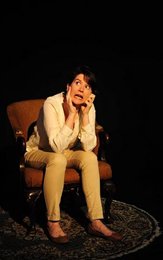Darwin: A Life in Poems was published in 2009 amid a surge of cultural activities celebrating the bicentenary of Charles Darwin’s birth. Its author, Ruth Padel—a nature writer, poet and literary critic—is Darwin’s great great grand-daughter. Fittingly, Padel demystifies the static image of Darwin, the naturalist, to add to our understanding of Darwin, the man. The book is a biography in verse, offering five chapters of poems, sensitively conjured and connected, as well as displaying Padel’s technical skills through a variety of stanza forms.
 For Mephisto’s stage adaptation of Darwin, producer/performer Caroline Lynch chose 38 poems out of over 100. These were aptly picked, showcasing the company’s creativity as well providing a linear overview of Darwin’s life. Mephisto often work without a director and, here, Lynch collaborated with Emma O’Grady on all other production and design decisions.
For Mephisto’s stage adaptation of Darwin, producer/performer Caroline Lynch chose 38 poems out of over 100. These were aptly picked, showcasing the company’s creativity as well providing a linear overview of Darwin’s life. Mephisto often work without a director and, here, Lynch collaborated with Emma O’Grady on all other production and design decisions.
The set evoked the Victorian era: an antique armchair sat on a paisley rug, flanked by a bureau desk on one side and a decorative folding screen on the other. O’Grady projected images and text—such as chapter titles—onto the backdrop. The chapters were punctuated by lights down as well as music, mostly Anglican hymns. These religious signifiers worked with the precision of the nature poems, intensifying the interplay between the scientific and the spiritual that permeates Padel’s collection. The lyrics of the opening hymn, ‘All Things Bright and Beautiful,’ were particularly suited to the interaction of nature and religion. The lighting throughout was carefully nuanced according to the changing moods of the piece. O’Grady, who offered a virtuoso performance in Mephisto’s 2010 production of Tara McKevitt’s Grenades, revealed the breadth of her talent here through her proficiency in lights, visuals and sound.
Lynch was an apt choice as the solo-performer; she is an accomplished poet and her first play, Almost a Fantasy (2011), is full of rhythmic verse. In this context, her striking command of Padel’s musicality was to be expected. Yet, the range of her acting skills also became apparent as the piece developed. Her coy delivery amplified the humour of quotes such as Darwin’s justification for marriage: a wife, he reasoned in his journal, would be “better than a dog.” This was balanced by the depth of Lynch’s emotion during sadder moments, for example the poems concerning the sickness and subsequent death of Darwin’s daughter, Annie.
Padel’s poems move from telling us about her ancestor’s early life, to appropriating his voice and, sometimes, fragments of other perspectives too. O’Grady and Lynch imaginatively rendered these fleeting characters; as portraits of those close to Darwin were projected, Lynch embodied the corresponding personae. The production began like a recitation but gradually progressed in action and emotion, bringing Padel’s work to life.
.jpg.aspx%3Fwidth=260&height=179) The obscure beauty of Padel’s poems often hinge on making the familiar strange. However, some of the material might be difficult to understand without a prior knowledge of Darwin’s biography. The programme was useful in this area, providing a chronology of appropriate historical information. The collection also incorporates extracts from Darwin’s letters and diaries, such as the copious notes he took on his voyage aboard the HMS Beagle. Reviewing Padel's book for the Guardian, Richard Holmes questioned whether a piece that seemed merely to summarise Darwin’s April 1832 letter to his sister from Rio Harbour could qualify as poetry. However, Mephisto revealed through performance how such documents can be transformed into art. What seemed like a static set proved both versatile and evocative as Lynch (playing Darwin here) crouched beneath the desk’s open front panel to thoughtfully ‘write’ (and recite) the letter. With O’Grady’s dim lighting, this helped to convey the wooden nooks within the bowels of a ship. Later, Lynch conjured Darwin’s seasickness by progressing from a gentle swaying to reeling, while using the desk’s hinges to create a cumulative creaking sound.
The obscure beauty of Padel’s poems often hinge on making the familiar strange. However, some of the material might be difficult to understand without a prior knowledge of Darwin’s biography. The programme was useful in this area, providing a chronology of appropriate historical information. The collection also incorporates extracts from Darwin’s letters and diaries, such as the copious notes he took on his voyage aboard the HMS Beagle. Reviewing Padel's book for the Guardian, Richard Holmes questioned whether a piece that seemed merely to summarise Darwin’s April 1832 letter to his sister from Rio Harbour could qualify as poetry. However, Mephisto revealed through performance how such documents can be transformed into art. What seemed like a static set proved both versatile and evocative as Lynch (playing Darwin here) crouched beneath the desk’s open front panel to thoughtfully ‘write’ (and recite) the letter. With O’Grady’s dim lighting, this helped to convey the wooden nooks within the bowels of a ship. Later, Lynch conjured Darwin’s seasickness by progressing from a gentle swaying to reeling, while using the desk’s hinges to create a cumulative creaking sound.
Mephisto’s adaptation enlivened the journey through Darwin’s life, but remained relatively faithful to Padel’s text. Beyond the music, images and set, the company worked only with material found in the book. Even the final song, a Welsh version of ‘All Through the Night,’ is described in one of the poems as the only tune Darwin ever tried to hum.
Padel’s collection reveals the striking commonality between poetry and science: both shed new light on life’s phenomena, albeit in different ways. Through sensitive yet inventive staging, Mephisto’s production proved that theatre, too, can allow us to experience history and nature anew.
Siobhán O’Gorman teaches at the National University of Ireland, Galway, where she has just completed her doctorate in contemporary theatre.